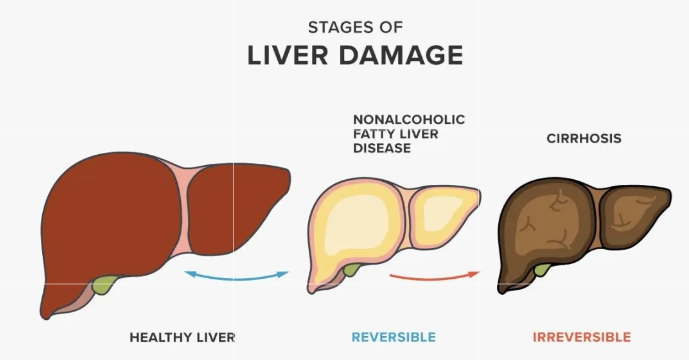Steatotic liver disease, also known as fatty liver disease, encompasses a range of conditions where fat accumulates in the liver cells. Here’s a breakdown of its symptoms and treatment options:

Symptoms:
Fatigue: Feeling tired or fatigued even with adequate rest.
Pain: Discomfort or pain in the upper right abdomen.
Enlarged Liver: The liver may become enlarged and tender to touch.
Ascites: Accumulation of fluid in the abdominal cavity, causing swelling.
Jaundice: Yellowing of the skin and eyes due to liver dysfunction.
Weight Loss: Unexplained weight loss may occur in some cases.
Nausea and Loss of Appetite: Digestive symptoms like nausea and reduced appetite can occur.

Treatment
Lifestyle Changes: The primary treatment involves lifestyle modifications, including:
Weight Loss: Losing weight through a combination of diet and exercise can reduce liver fat.
Healthy Diet: Consuming a balanced diet low in saturated fats, sugars, and refined carbohydrates can help.
Regular Exercise: Physical activity improves insulin sensitivity and aids in weight management.
Limit Alcohol: For those with alcoholic fatty liver disease, abstaining from alcohol is crucial.
Medications: In some cases, doctors may prescribe medications to manage underlying conditions like diabetes, high cholesterol, or hypertension.
Nutritional Supplements: Certain supplements like vitamin E and omega-3 fatty acids may be beneficial, but their use should be discussed with a healthcare provider.
Monitoring: Regular monitoring of liver function and imaging studies can track the progress of the disease and guide treatment adjustments.
Avoiding Hepatotoxic Substances: Patients should avoid exposure to hepatotoxic substances such as certain medications or chemicals that can further damage the liver.
Medical Procedures: In severe cases or when complications arise, medical procedures like liver transplantation may be necessary.
It’s important to note that early detection and intervention can significantly improve outcomes for individuals with fatty liver disease. Consulting a healthcare professional for an accurate diagnosis and personalized treatment plan is essential.
